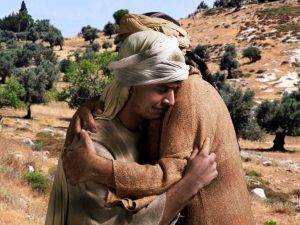U for Unity
We pray, of course, we all have our favourite formulas to address God.
We present multiple requests to him, and we also thank him.
It is possible that we ask ourselves the question: When he was praying to his father, how did Jesus do this?
One day, his apostles having seen him pray, asked him to teach them to pray.
We know that he then taught them the prayer of the Our Father (Luke 11:1-4).
But we still think: he, himself, how did he pray?
Apart from his prayer during his agony in the Garden of Olives, and his petition on the cross, we know little of his personal prayer.
One day, marveling at the faith of simple people, he exclaimed:
“I praise you, Father, Lord of heaven and earth,
because you have hidden these things from the wise and learned,
and revealed them to little children” (Matthew 11:25-26).
On another occasion, before bringing Lazarus back to life, he addressed his Father, saying:
“Father, I thank you that you have heard me.
I knew that you always hear me,
but I said this for the benefit of the people standing here,
that they may believe that you sent me” (John 11:41-42).
These two texts are meaningful.
Yet, there is another one which I think of – it is the prayer Jesus pronounced on the eve of his death, a solemn moment indeed.
It was during the Jewish Passover meal and, at the end of the meal, Jesus said:
 “That all of them may be one, Father,
“That all of them may be one, Father,
just as you are in me, and I am in you.
May they also be in us,
so that the world may believe that you have sent me” (John 17:21).
This text makes clearly known to us the desire of Jesus for us, believers.
But more than 2,000 years after he prayed in this way, his desire is still… waiting to be realized…
The groups of those who call themselves disciples of Christ have been multiplied in an amazing manner…
The groups of Christians have become diversified according to their different beliefs…
Worse still, their way of treating each other is sometimes deplorable…
Of course, there are praiseworthy efforts to come really closer to one another but… there is still a long way to go.
Travelling, one day, in a foreign country, I found myself at a crossroads of four streets.
On the site of three of them, there was a church built for the Christians of different denominations.
Of course, all of them claimed that Christ was with them…
We need to learn how to pray as Jesus did, and pray with him, HIS prayer…

 T for Time
T for Time
 S for Signs
S for Signs

 Having returned to himself, he decides to return to his father.
Having returned to himself, he decides to return to his father. This situation came to my mind as I read the 2nd reading of today’s celebration (Ephesians 2:4-10).
This situation came to my mind as I read the 2nd reading of today’s celebration (Ephesians 2:4-10).
 Q for Questions
Q for Questions Invest in women: Accelerate progress
Invest in women: Accelerate progress P for Pray
P for Pray